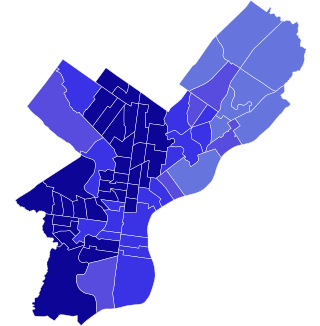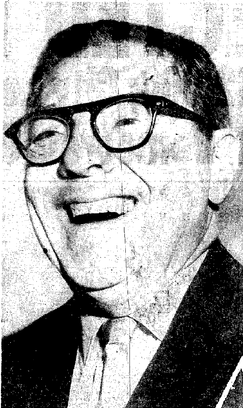
Joseph Sill Clark Jr. was an American writer, lawyer and politician. A member of the Democratic Party, he served as the 90th Mayor of Philadelphia from 1952 to 1956 and as a United States Senator from Pennsylvania from 1957 to 1969. Clark was the only Unitarian Universalist elected to a major office in Pennsylvania in the modern era.

Richardson K. Dilworth was an American Democratic Party politician who served as the 91st mayor of Philadelphia from 1956 to 1962. He twice ran as the Democratic nominee for governor of Pennsylvania, in 1950 and in 1962. He is to date the last White Anglo-Saxon Protestant mayor of Philadelphia.
William Thacher Longstreth was a Republican member of the Philadelphia City Council who was perhaps best known for his long tenure and unique image.

The 2015 Philadelphia mayoral election was held on November 3, 2015, to elect the Mayor of Philadelphia, Pennsylvania, concurrently with various other state and local elections. Heavily favored Democratic party candidate Jim Kenney won.

Constance Hopkins Snow Dallas was an American politician. A member of the Democratic Party, she served on the Philadelphia City Council as a representative of the city's 8th district. Born in New York and educated in Europe, Dallas came to Philadelphia as a teenager. After marriage and raising children, she entered local politics as a reform-minded Democrat. Following an unsuccessful run for City Council in 1947, she was elected in 1951, the first woman to serve in that legislative body.

The 1951 Philadelphia municipal election, held on Tuesday, November 6, was the first election under the city's new charter, which had been approved by the voters in April, and the first Democratic victory in the city in more than a half-century. The positions contested were those of mayor and district attorney, and all seventeen city council seats. There was also a referendum on whether to consolidate the city and county governments. Citywide, the Democrats took majorities of over 100,000 votes, breaking a 67-year Republican hold on city government. Joseph S. Clark Jr. and Richardson Dilworth, two of the main movers for the charter reform, were elected mayor and district attorney, respectively. Led by local party chairman James A. Finnegan, the Democrats also took fourteen of seventeen city council seats, and all of the citywide offices on the ballot. A referendum on city-county consolidation passed by a wide margin. The election marked the beginning of Democratic dominance of Philadelphia city politics, which continues today.

Victor Hugo Blanc was a Democratic lawyer and politician from Philadelphia.

William Milton Phillips was a Republican businessman and politician from Philadelphia.

Philadelphia's municipal election of November 3, 1953, was the second held under the city charter of 1951 and represented the first test of the Democratic city government of Mayor Joseph S. Clark Jr. In the 1951 election, the voters had elected a Democratic mayor for the first time in 67 years, breaking the Republican hold on political power in the city. They had also elected a majority-Democratic City Council along with Democrats for district attorney and other citywide offices. In 1953, the voters had the chance to continue the Democratic trend or to block it in the election for City Controller, Register of Wills, and various judges and magistrates. On election day, the Republican organization recovered from their 1951 losses, electing all their candidates citywide. Republicans celebrated the victory, but subsequent Democratic triumphs in the 1955 and 1959 elections made the 1953 result more of an aberration than a true comeback for the once-powerful Philadelphia Republican machine.

The 1957 Philadelphia municipal election, held on November 5, involved the election of the district attorney, city controller, and the remainder of a term for one city council seat, as well as several row offices and judgeships. Democrats were successful citywide, continuing a run of victories racked up after the passage of a new city charter in 1951 despite growing divisions between factions of the party. Victor H. Blanc, the incumbent district attorney, led the Democratic ticket to victory. They held the city council seat and took two citywide offices that Republicans had won in 1953. In the judges' elections, most were endorsed by both parties but in the one race that pitted a Democratic candidate against a Republican, the Democrats were successful in seating their candidate, former Congressman Earl Chudoff.

1959 Philadelphia's municipal election, held on November 3, involved contests for mayor, all seventeen city council seats, and several other executive and judicial offices. Citywide, the Democrats took majorities of over 200,000 votes, continuing their success from the elections four years earlier. Richardson Dilworth, who had been elected mayor in 1955, was re-elected over Republican nominee Harold Stassen. The Democrats also took fifteen of seventeen city council seats, the most seats allowed to any one party under the 1951 city charter. They further kept control of the other citywide offices. The election represented a continued consolidation of control by the Democrats after their citywide victories of the previous eight years.

The 1960 Philadelphia City Council special election was held to fill two vacant city council seats. The first was in the 4th district, when Democrat Samuel Rose died in January 1960. A second vacancy that same year occurred in the 6th district when Democrat Michael J. Towey died suddenly in September 29. Special elections were scheduled for November 8, 1960, to be held at the same time as the national election that year. Both seats were easily held by the Democratic Party.

William Aloysius Dwyer Jr. was an American lawyer, judge, and Democratic politician from Philadelphia. He served on the Philadelphia City Council from 1960 to 1963 and on the Pennsylvania Court of Common Pleas from 1967 until his death in 1982.

Philadelphia's municipal election of November 7, 1961, involved the election of the district attorney, city controller, and several judgeships. Democrats swept all of the city races but saw their vote totals much reduced from those of four years earlier, owing to a growing graft scandal in city government. District Attorney James C. Crumlish, Jr. and City Controller Alexander Hemphill, both incumbents, were returned to office. Several ballot questions were also approved, including one permitting limited sales of alcohol on Sundays.

Alexander Hemphill was a Democratic lawyer and politician from Philadelphia who served as City Controller from 1958 to 1968. After service in World War II and graduation from the University of Pennsylvania Law School, Hemphill embarked on a legal career before running for office. In his three terms as city controller, he exposed corruption and malfeasance, often to the discomfort of his fellow Democrats. He ran for mayor of Philadelphia in 1967 against the incumbent Democrat, James Tate, but was unsuccessful, and retired to a private law practice until his death in 1986.

Philadelphia's City Council special election of 1962 was held to fill three vacant city council seats. The first was in the 8th district, when Democrat Alfred Leopold Luongo was appointed to the federal bench in September 1961. A second vacancy that same year occurred in the 10th district when Democrat John M. McDevitt resigned in June 1962 to become a Catholic priest. An at-large seat also became vacant when Victor E. Moore resigned in September 1962 to become the head of the Philadelphia Gas Works. Special elections were scheduled for November 6, 1962, to be held at the same time as the federal and gubernatorial elections that year. Democrats held two of the seats but lost the 8th district to a Republican.

The 1963 Philadelphia's municipal election, held on November 5, involved contests for mayor, all seventeen city council seats, and several other executive and judicial offices. The Democrats lost vote share citywide and the Republicans gained one seat in City Council, but the Democratic acting mayor, James Tate, was elected to a full term and his party maintained their hold on the city government. The election was the first decline in the Democrats' share of the vote since they took control of the city government in the 1951 elections, and showed the growing tension between the reformers and ward bosses within their party.

Austin Andrew Meehan, Sr., was a Republican politician in Philadelphia who served as county sheriff. Before entering politics, Meehan ran his family's paving business and was known as a local basketball star. Beginning as an insurgent within the city's Republican Party, he soon won the favor of party bosses and climbed the ranks of Philadelphia's Republican organization. Meehan served two terms as county sheriff from 1944 to 1952 and was recognized as the unofficial head of the Republican Party in Philadelphia in the 1950s. He remained an influential party member until his death in 1961. He was the father of Billy Meehan.

Walter Stanley Pytko was a Democratic politician from Philadelphia. Active in Polish-American groups in Philadelphia's Bridesburg neighborhood, Pytko also became involved in local politics. He served one term in the Pennsylvania State Senate in the 1930s and worked in various government agencies through the 1940s and 1950s. In 1962, he was elected to the Philadelphia City Council, where he served until retiring in 1968.

The 1971 Philadelphia mayoral election took place on November 2, 1971, to fill the 182nd mayoral term in Philadelphia, with Democratic nominee Frank Rizzo defeating Republican Thacher Longstreth. While Longstreth received many split ticket votes from Democrats, Rizzo found support among unions and the white working-class electorate.

















